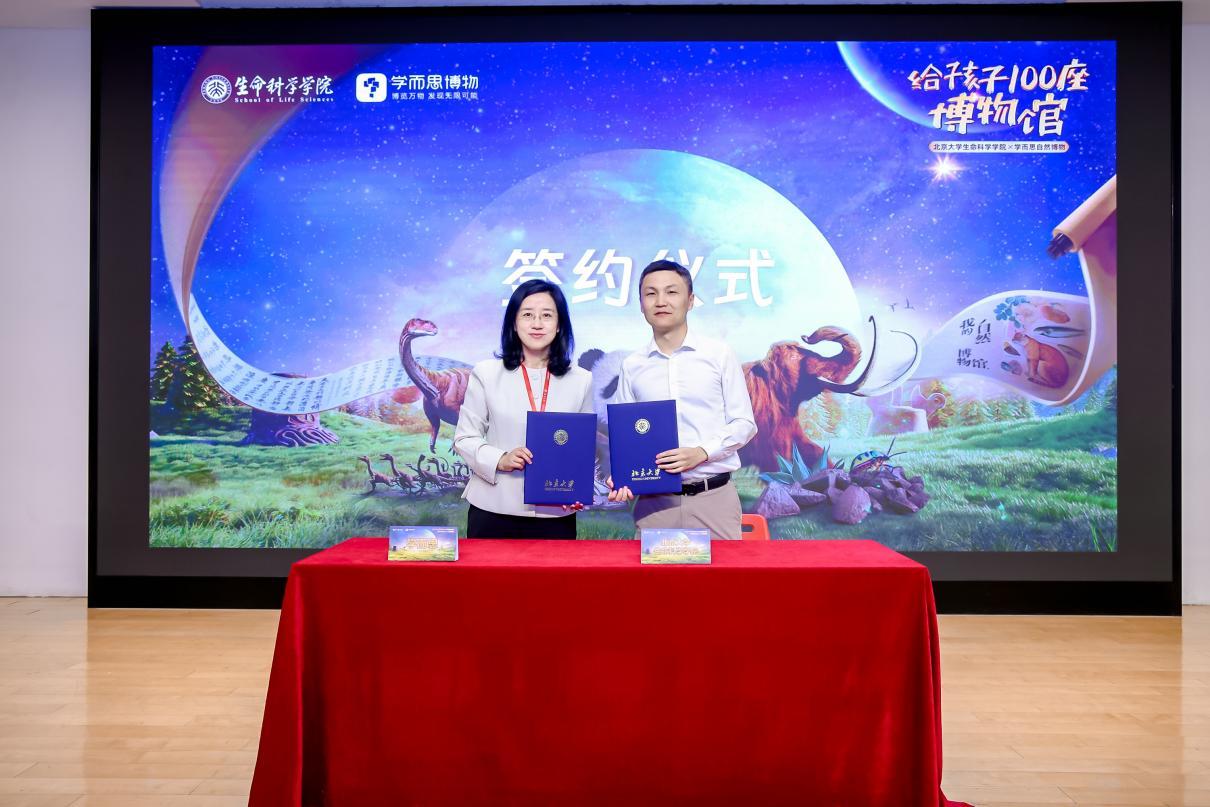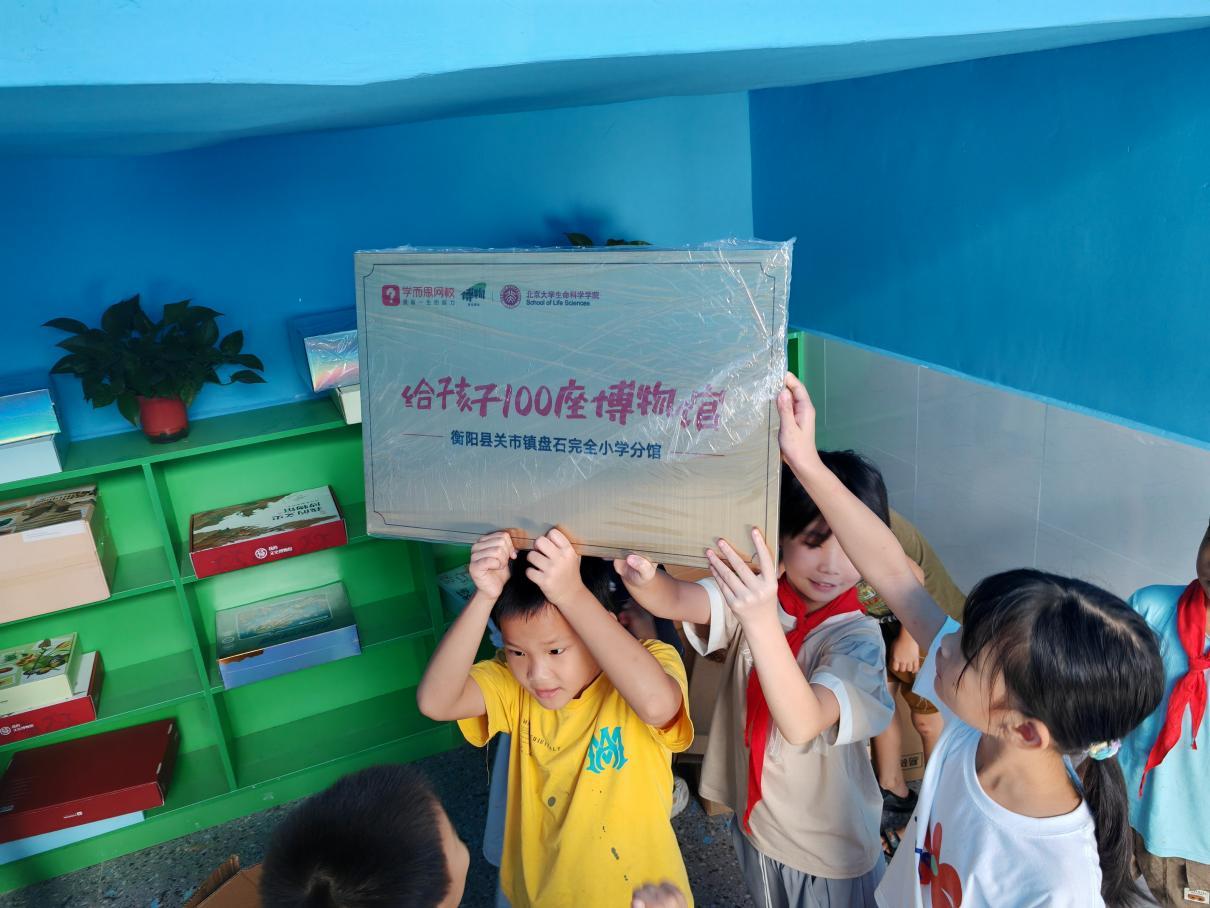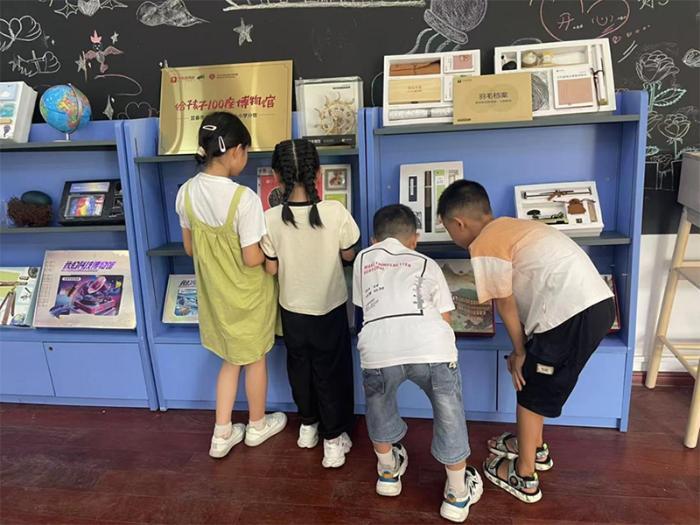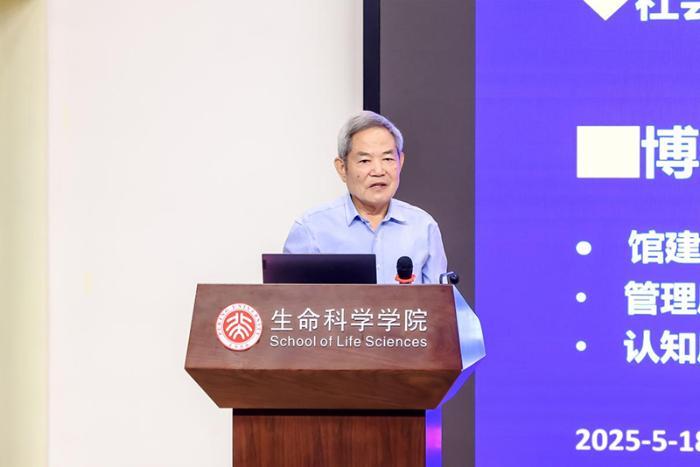




On May 18th, International Museum Day, the School of Life Sciences at Peking University partnered with Xueersi Bowu to officially launch the second phase of the “100 Museums for Children” public welfare project. Simultaneously, the “Peking University Training Program for Sustainable Development Talent in Elementary and Middle School Museum Education” was inaugurated.
Following the donation of miniature museums to 100 elementary schools nationwide in the first phase of the 2024 project, the second phase has undergone a comprehensive upgrade. It aims to build a scientific education ecosystem comprising “hardware support + teacher training + outcome incubation,” seeking to transform museum resources into a sustainable force for science education in rural schools.

Signing ceremony of the second phase of the “100 Museums for Children” public welfare project. Right: Shi Changyi, Party Secretary of the School of Life Sciences, Peking University. Left: Laura (Wei Chen), Executive Vice President of Xueersi.
“Delivering 100 Museums” to Address Challenges in Rural Science Education
Since the launch of the “100 Museums for Children” public welfare project last year, Xueersi has successfully donated “miniature museums” to nearly 100 schools located in remote and underdeveloped areas in central and western China. These have provided tens of thousands of students with “on-site science exploration platforms.” Notably, many students have actively taken on the role of “small applicants,” securing these high-quality museum resources for their schools.
Under the guidance and support of national policies, science education has gained widespread attention in rural elementary schools. However, specific challenges remain in some schools, such as outdated teaching tools and a shortage of dedicated science teachers, with educators from other disciplines shouldering dual responsibilities.
The donated “miniature museums” address these challenges by providing invaluable support for teachers. A “miniature museum” consists of systematic teaching toolkits, each tailored to a unique theme such as nature, technology, or history. Each kit contains curated artifacts and supplementary curricula, allowing children to engage with fossils from billions of years ago, valuable natural specimens, cutting-edge scientific devices, and diverse historical artifacts. This hands-on approach has significantly sparked their curiosity.


The “100 Museums for Children” public welfare project has reached elementary schools in multiple provinces nationwide over the past year.
Through the implementation of this public welfare project, rural schools are gaining new tools and highlights in science education. Cheng Xiaofei, Party Branch Secretary of Heming Elementary School in Song County, Henan Province, has actively led all aspects of the “miniature museum,” including applications, exhibitions, and science festival organization. Cheng personally served as a museum guide, integrating the local cultural heritage of Luoyang, the “Ancient Capital of Thirteen Dynasties.” Using the example of the “Ancient Bronze Chariot and Horse Model,” he introduced students to the ancient hierarchy of carriages: the Zhou King’s chariots were drawn by six horses, whereas the model in the miniature museum, featuring a four-horse carriage, represents the rank of a duke, three horses signify senior officials, and one or two horses were used by commoners. “These exhibits act as bridges between the past and present. When children find that the history in their textbooks can be tangibly explored in the miniature museum, their thirst for scientific and cultural discovery is ignited.”
Similar scenes have unfolded in other rural schools. In the first phase of the “100 Museums for Children” project, schools actively embraced the “miniature museums” to enhance science education and achieved remarkable outcomes. At the event, an award ceremony was held to honor project schools participating in the public welfare initiative. This acknowledgment not only recognized the efforts and achievements of these schools in advancing science education but also inspired more schools to engage in innovative practices. It aims to further progress science education in rural areas.
Professional Training to Foster Rural Science Education Expertise
In the second project phase, in addition to donating “miniature museums,” the “Peking University Training Program for Sustainable Development Talent in Elementary and Middle School Museum Education” was also launched. Jointly developed by the School of Life Sciences at Peking University and Xueersi Bowu, this two-day training program equips teachers with essential skills, including museum curriculum design principles, school-based curriculum development, and miniature museum management. The program’s purpose is to cultivate professional teaching talent for rural science education.
The course design emphasizes a blend of theory and practice. For example, Professor Guo Chuanjie, an academician from the International Eurasian Academy of Sciences, discussed the importance of museum and science education and existing challenges. Professor He Xinqiang from Peking University, utilizing the abundant resources of the Peking University Biological Specimen Museum, shared invaluable experience in creating unique “school-based courses,” guiding teachers to design exploratory lessons that spark student interest through biological specimens. Additionally, master teacher Guo Zhibin from Shijia Hutong Primary School shared techniques for integrating Chinese traditional culture into museum curricula, enriching courses with cultural substance. Furthermore, Dr. Zhang Dan and Dr. Meng Hao from Xueersi Bowu, together with Peking University’s Meng Shiyong and Liu Chao, demonstrated campus-based practical lessons to provide continuity between “school museums and after-school practices.”

Guo Chuanjie, academician of the International Eurasian Academy of Sciences, teaching at the training program.
The training program adopts a “theory-to-application” cultivation model. Teachers who successfully complete the course will receive a certificate of completion from Peking University’s “Training Program for Sustainable Development Talent in Elementary and Middle School Museum Education.” In the application phase, instructors like Zhang Chao from China National Astronomy magazine demonstrated how to establish an in-school platform for showcasing astronomical science achievements, while Sun Kai, chief editor of Children’s Science Pictorial, taught methods for writing high-quality science articles. Teachers guiding students to complete practice projects will have the opportunity to publish their work in prestigious journals such as China National Astronomy or Children’s Science Pictorial, gaining wider recognition and promoting the advancement of rural science education.
Source: China News Network https://www.chinanews.com.cn/cj/2025/05-19/10417992.shtml